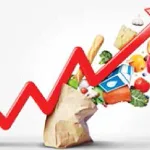Nigerian Households Shift Spending Priorities, Says CBN Survey
A recent survey conducted by the Central Bank of Nigeria (CBN) reveals that Nigerian households are preparing to allocate a significant portion of their income to essential needs such as food, education, and transportation over the next six months.
The survey carried out between 22nd July 22 and 26th July 2024, reflects the continued economic strain many Nigerians are experiencing, leading them to make cautious spending decisions.
Join our WhatsApp ChannelFocus on Essentials: Food, Education, and Transportation
According to the CBN’s July 2024 Household Expectations Survey, the majority of respondents indicated that they would prioritise spending on necessities.
The survey revealed that 54.9% of the respondents plan to allocate their income primarily to food and other household items, followed by education at 35.4% and transportation at 30.2%.
The CBN’s report emphasised this trend: “Spending outlook for the next six months showed that consumers plan to spend a substantial amount of their income on the following items: Food and other Household Items (54.9 points), Education (35.4 points), Transportation (30.2 points), Electricity (20.0 points), and Medical Expenses (12.2 points).”
Reduced Spending on Big Purchases
In stark contrast to the focus on essentials, the survey highlights that Nigerians are less inclined to spend on big-ticket items such as housing, vehicles, and appliances.
The indices for purchasing houses and cars/motor vehicles stand at -56.9 and -55.6 points, respectively. This data indicates a reluctance to engage in significant expenditures in these areas.
Additionally, the survey shows a low intent to invest or save, with indices at -22.6 and -9.3 points respectively. This suggests that many Nigerians are adopting a cautious approach toward financial planning in the face of ongoing economic challenges.
READ ALSO: Naira Ends August Negative, Loses N28.56 At Official Market Amid CBN Intervention
The CBN’s report stated, “On the other hand, they do not plan to spend a substantial amount of income on big-ticket items such as Purchase of House (-56.9 points), Purchase of Car/Motor Vehicle (-55.6 points), Purchase of Appliances (-30.1 points). They do not intend to spend on Investment (-22.6 points) and Savings (-9.3 points).”
Economic Strain Continues
The survey also underscores the continued economic strain on Nigerian households, with many respondents anticipating the need to draw down on their savings or incur debt to meet essential expenses.
This trend reflects the broader challenges faced by Nigerian consumers amid rising living costs and uncertain economic conditions.
In response to these findings, an economist commented, “The CBN survey highlights the tough choices Nigerian households are making. With rising costs and limited income, people are prioritizing essentials and avoiding major purchases.”
Current Spending Outlook
The CBN’s survey also revealed a growing anticipation of increased household spending in the current month. The spending outlook index rose to 50.2 points, up from 48.7 points recorded in the previous month, indicating that more households are preparing for higher expenditures.
This upward trend is expected to persist over the next month, three months, and six months, with indices standing at 48.1, 46.4, and 47.5 points, respectively.
Looking Ahead
As Nigerian households continue to navigate economic uncertainties, the data from the CBN survey provides valuable insights into the spending priorities and financial strategies of consumers.
With a clear focus on essentials and a cautious approach to investments and savings, Nigerians are bracing for challenging months ahead.
The CBN’s findings underscore the need for policies that can alleviate the financial burdens faced by households and promote economic stability in the long term.
Emmanuel Ochayi is a journalist. He is a graduate of the University of Lagos, School of first choice and the nations pride. Emmanuel is keen on exploring writing angles in different areas, including Business, climate change, politics, Education, and others.



















Follow Us